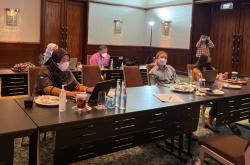“Monitoring and evaluation can help an organization extract relevant information from past and ongoing activities that can be used as the basis for programmatic fine-tuning, reorientation, and future planning,” states the UNDP’s Handbook on Planning, Monitoring and Evaluating for Development Results.
Siphra Jane Tampubolon is a Health Monitoring and Evaluation (M&E) Specialist and serves as a National UN Volunteer with UNDP Indonesia. She is with the Health Governance Initiative (HEART) since 1 August 2021 up until July 2022.
Jane received her Master’s in Public Health from New York University. Her focus was global health policy with an emphasis on improving the quality of health systems and addressing health inequality in lower and middle income countries. Her main interest – Implementation Science – carries on within her current role as M&E Specialist.
In partnership with the Ministry of Health and the Ministry of Economic Affairs, UNDP Indonesia provides technical assistance to help increase capacity in the health system and highlight severe health problems. The collaboration aims to share technical expertise for inclusive growth and provide better health services that align with the Sustainable Development Goals (SDGs) and Indonesia’s national priorities.
Under the Health Governance Cluster, UNDP supports national efforts to achieve the 2030 SDG indicator 3.8.1 and national priority Rencana Pembangunan Jangka Menengah Nasional (RPJMN) 2020-2024 to improve access and quality of health services. Projects under the initiative include working in areas of health technology; financial management of Aids, Tuberculosis and Malaria program; and waste management.
In response to the COVID-19 pandemic, HEART collaborates with various stakeholders to procure health equipment, strengthen supply chain management systems and manage medical waste. Furthermore, digital health data is made possible under two projects – SMILE and STRATEGIC – which aim to integrate immunization data and improve vaccination stock management, quality, and consumption patterns.
Monitoring and evaluation for SMILE and STRATEGIC projects help innovative digital solutions improve COVID-19 vaccination access and delivery. The improved management of integrated digital data systems contributes to the achievement of SDG 3.8 in expanding essential health access to all and progress towards universal health coverage.
Jane’s contribution to HEART ensures project outputs delivered in line with the work plan and project scope. In addition, she coordinates donor and partner reports and manages knowledge sharing.
In her volunteer assignment, she develops frameworks and tools that can be used to monitor progress and performance of activities, track achievement of goals and carve out a system to disseminate a knowledge product (for example: lessons learned, success story). She provides regular updates about her daily tasks, monitoring and evaluation activities, and collaborates with the project team in research and production of reports.
The monitoring and evaluation activity is crucial to reorient the focus of the programme to systematic development changes. By carrying out result-oriented monitoring and evaluation, the programme ensures national ownership, capacity building and human development.
Monitoring and evaluation also recognizes the importance of openness, transparency and accountability – crucial to transformational solutions and cuts across six priority areas of poverty, governance, environment, resilience, energy, and gender.
COVID-19 has changed many aspects of life and work. Transforming the health delivery system to digital standards will only grow after the pandemic had ended. As dependence on smartphones and internet increases, so does the opportunity to access healthcare digitally.
Integration of one health data through digital means will guide policy makers in setting priorities and regulations that address health issues. In Jane’s opinion, this phenomenon widened her horizon into new ways of combating health inequities. This is especially true in the case of sexual and reproductive healthcare, which is still considered taboo in many circles.
Through her volunteer work, Jane meets like-minded people who are eager to try new ideas and solutions. She utilizes her skills and improves them while solving real-life problems. She is creative in engaging community members to solve health issues together.
Eko Cipako Sinamo, UNDP Project Associate shared his insight on UNV’s contribution, "The UNV programme creates a medium for individuals to apply their skills to contribute to community development and local governance. Within HEART, UNV supports the Monitoring and Evaluation activities including integrating all indicators from different projects into one M&E Framework that is in accordance with our Approved Project Documents. In return, this experience has provided UN Volunteers a meaningful learning experience regarding how UNDP has responded to better access, more equitable, higher quality basic health care for the community. Volunteerism is a rewarding opportunity for both the individual and the community it serves."
Volunteering is a medium to express your passion in a meaningful way. It brings like-minded people together to solve problems and build a more resilient community. And in doing so, your skills and expertise can touch the hearts of people and contribute to bigger things than you can ever imagine.
In Jane’s case, her monitoring and evaluation work ensures a broader impact of healthcare for the population in need.
This article was prepared with the kind support of Online Volunteer Kathakali Das Bhaumik.

